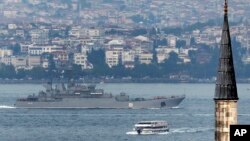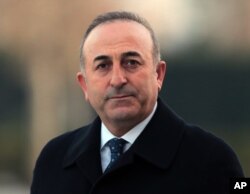The escalating tensions between Moscow and Ankara over last month’s downing of a Russian fighter by Turkish jets is threatening to resurrect an age-old rivalry over access to Turkey’s Bosphorus and Dardanelles waterways.
Turkey’s 30-kilometer Bosphorus waterway, which cuts Istanbul in half, is the gateway from the Black Sea to international waters.
The waterways are key to both Russian trade, with much of the country's oil passing through, and its Black Sea navy, in particular the supplying of it bases in Syria.
Restricting access
Retired Turkish ambassador Murat Bilhan warns restricting access to the Bosphorus could become an option for Ankara.
"In case there is an escalating conflict with Russia, then Turkey could use that card because, according to the Montreux Agreement, if Turkey is partied to a conflict, the other side to the conflict would be prevented from passing. But it's a very dangerous trump card, of course," Bilhan said.
Use of the Bosphorus and Dardanelles waterways is guaranteed under the 1936 Montreux Convention.
Ankara has never blocked access to the straits. But Russian media have accused Turkish authorities of deliberately delaying some ships access; a charge Ankara denies.
Political scientist Cengiz Aktar of Istanbul’s Suleyman Sah University warned if Ankara uses the straits against Moscow, it carries major risks.
"It will create a major international tension. But I mean we don't know how Ankara will be reacting. The stakes are high and open," Aktar said.
Montreux Convention
Observers warn any interference with the use of the straits could result in calls for the Montreux Convention to be rewritten, something Ankara is keen to avoid.
But tensions were ratcheted up further this week with the appearance of a photo of a Russian sailor on a warship transiting the Bosphorus, shouldering a portable surface-to-air missile.
Turkish Foreign Minister Mevlut Cavusoglu called it a provocation, warning of unspecified actions.
Retired Turkish ambassador Bilhan points out Ankara could play the environmental card to block traffic in the straits.
"Big tankers, transoceanic tankers are becoming a danger to the straits and especially Istanbul. Istanbul has a population of 18 million people now," he said.
With Moscow and Ankara intensifying their support for opposing sides in the Syrian civil war, and the waterway a vital supply route for Russian bases in Syria, observers warn the area seems destined to remain a focal point of bilateral tensions.















